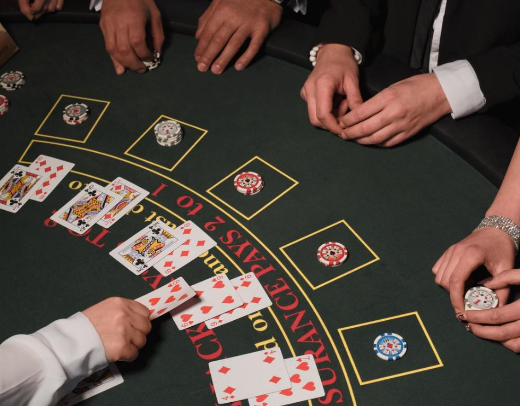Common online blackjack mistakes to avoid
If you are new to online blackjack, you may well be wondering how to avoid rookie mistakes that make you look like a newbie. Whether you are playing casino-based blackjack, automated online blackjack, or live blackjack in the online casino live dealer lobby, our tips are the same. There are a range of common blackjack mistakes to avoid. Here they are, with some advice about what to do instead.
Assuming the game is simpler than it is
One of the reasons blackjack is a very popular game in most casino lobbies is that it is relatively simple to play, and the learning process can be quite quick. However, there is a little more to it than most players realize. Some of us have played blackjack at home with friends for fun, but we probably haven’t been following all the rules in these casual games. Take some time to learn about things like splitting, doubling down and placing side bets, along with basic strategy, before you dive into casino blackjack.
Treating blackjack as a game of chance
There is certainly luck involved in blackjack, but there is some skill to the game as well. The main thing beginners need to learn is when to hit and when to stand, along with when to split or surrender. When you watch a game, you may think that players are making snap decisions based on whether they have a high or low hand but look closer and you will see that experienced players are noting their own hand and the dealer’s card before making a decision. Skilled blackjack players will tend to make fairly consistent decisions in the game because they know that winning relies on both luck and strategy.
Taking the insurance bet
An insurance bet is a side bet based on the assumption that the dealer has a blackjack. It is a separate bet that is half the amount of the initial wager. The very fact that it is called an insurance bet creates the illusion that it is a safe bet, but statistically, it really isn’t. The chances of the dealer having blackjack are actually very low, so the house edge on an insurance bet is pretty high. Blackjack has a very low house edge overall. In fact, an experienced player in a multi-deck game, using a basic strategy, will often see a house edge of as low as 0.5%. Taking the insurance increases the house edge to up to almost 6%.
Relying on card counting strategies
Blackjack card counting strategies are widely discussed online. They don’t involve trying to keep track of every card, but rather keeping a rough mental tally of how many high and low cards have been played to give you an idea of the probability of another high card coming up. Good card counting strategies can decrease the house edge a little if you are an experienced player, but for most beginners, it’s really hard to count cards well. Most casinos also try to guard against card counting by using more than one deck, often playing with as many as six or eight. Learning basic blackjack card counting strategies can be fun for some people, but don’t rely on it as a winning strategy.
Using progressive betting systems
Gamblers use a wide range of progressive betting strategies, such as the Martingale and the Fibonacci. They can be used in any game, not only in blackjack. The problem with these strategies is that they really aren’t based on any solid mathematical concepts and often advise constantly increasing the amount you bet with each hand. This means you can lose a lot of money quickly and exhaust your bankroll before you hit a winning streak. That’s something you definitely don’t want to do.
Ignoring bankroll management
Managing your bankroll is essential, not just in blackjack but in any casino game you play. Managing your bankroll is about having a budget for your gambling and using it wisely. Knowing what your budget allows you to plan how you will bet for maximum enjoyment, as well as to maximize any winnings. Beginners will find that lots of small bets can help them stay at the table longer and therefore gain more experience. The higher the number of betting units you have, the less chance you will run through them before winning anything back. This is only based on statistical probability, of course. You could place one big bet, win it and immediately be in profit. It’s just that this scenario is not statistically likely.
Chasing losses
This is related to the point above and, again, can apply to other types of gambling, not just blackjack. Chasing losses refers to the habit, common among gamblers, of continuing to gamble after experiencing a series of losses in an attempt to win back the money that you have lost. Chasing losses can quickly lead to problematic gambling, financial issues and even a gambling addiction. Always set yourself a budget to gamble with and be prepared to walk away when it is exhausted, even when you are on a losing streak. Don’t exceed your budget, and never gamble with money you cannot afford to lose or money that is needed for another commitment.
Not learning basic strategy
Although there are no guarantees, using a basic blackjack strategy will increase your chances of winning, statistically at least. That low house edge in blackjack is based on someone consistently playing with a basic strategy. You can buy blackjack strategy cards online and even in some casino gift shops. They’ll advise you what to do when your hand has a certain total value, depending on what the dealer’s up card is. For example, most basic strategy cards will advise you to always stand on 17 or higher (unless it is a ‘soft 17’ that includes an ace), but only stand on a hand of 16 if the dealer’s card is two through six and hit if the dealer’s card is higher.
Splitting every pair
You can split in blackjack if you are dealt a matching pair and play two hands rather than one. That sounds great, doesn’t it? You now have two chances to win rather than one. Splitting a pair is not always a good idea, however. Generally, you shouldn’t split a pair of 10s as that’s already a good hand. The dealer would have to get blackjack to beat you. Splitting fours and fives is also not advisable. A starting hand value of eight or 10 is a good hand to play. Two hands starting with four or five have lower chances of success overall.
Constantly doubling your bets
You have the option to ‘double down’ in blackjack by doubling your bet after you have looked at your cards. While this can be a good idea occasionally, doing it too often will generally lead to you losing more money. After you double, you only get one more card. Based on what is in your hand, you are taking a risk that you will end up with a winning hand with just one further card. Many experts advise that unless you have the flexibility of an ace in your hand, you should only consider doubling down if your cards total nine, 10 or 11.
Trying out too many versions of blackjack
As with many casino games, blackjack comes in various different versions. While the principles are the same, there are differences in the rules and the gameplay with different variants of blackjack. There are sometimes differences in the odds offered and therefore the house edge as well. This can be confusing, especially for beginners. It is better for most players to pick one type of blackjack to play and stick to it, at least until you really understand the game and are getting good at it. Remember that different tables at the same casino will be offering different versions of the game, so make sure you know which one you’re playing before you start
.
Playing a six to five blackjack game
At most casinos, if you win against the dealer’s hand, your initial bet will pay out at three to two, but in some casinos, the bet pays six to five.
It’s good to avoid playing a six to five blackjack table if you can. The odds may sound very similar, but one is actually much better than the other. With a six to five bet, a $10 bet pays $12. With a three to two bet, a $10 bet pays $15. If you think about what that means for higher bets, the difference seems even bigger. A $100 stake pays out at $120 with a six to five bet, whereas a three to two bet with a $100 stake pays out at $150.
Playing blackjack games with a high number of decks
The number of decks in play makes a big difference to the house edge. Single-deck blackjack offers the lowest house edge of any online casino game. The average house edge stands at just 0.13% when only one deck is in play, which is why you’ll find many casinos tend to only offer games using multiple decks. Each deck added increases the complexity of the game. This means you should play the tables with the lower number of decks when you can. Again, different tables at the same casino may be playing with a different number of decks, so check carefully.
Sitting right next to the dealer
You don’t always get to choose your seat in blackjack, but when you do, choose carefully. The player in the first base chair next to the dealer plays first, then play continues around the table. Many players have theories about which seat is best, but it’s fair to say that seat position alone will not actually impact your chances of winning. However, for a less experienced players, avoiding the first seat and finding a place further down the table can give you an advantage. If you take the first base seat, there can be pressure to act quickly in some games. Taking a seat further down the table allows a little more time to review both your own hand and the dealer’s up card, which allows you to use your basic strategy rules to make consistent playing decisions.
Surrendering when you don’t have to
Surrendering in blackjack is when you decide not to play your hand and give up half your bet rather than risking it all. You usually get to surrender after you have seen your first two cards and the dealer’s up card. The early surrender option allows you to quit before the dealer checks for a blackjack. The late surrender lets you do the same only after the dealer turns their cards. With a late surrender option, you can only take half of your bet back if the dealer’s hand is not a blackjack. It can be tempting to surrender early if you have a bad hand, and that’s an option. However, you should only consider it if you have less than a 50% chance of winning against the dealer. Many experts advise only surrendering early if your hand is a 15 and the dealer has a 10, or if you have a 16 and the dealer has a nine, 10 or ace. The exception is if your 16 is composed of two eights, in which case you have a chance to split.
As you can see, there is a little more to blackjack than many beginner players imagine. Learning as much as you can about the game itself and the most common blackjack mistakes to avoid can make the whole experience more enjoyable. It can also help increase your chances of winning, minimize your chances of losing and help you limit losses when they do happen.
Our top five most common blackjack mistakes to avoid:
- Assuming the game is simpler than it is
- Not learning basic strategy
- Ignoring bankroll management
- Relying on card-counting strategies
- Using progressive betting systems
It’s easy to see why these blackjack mistakes are so common. Many of the blackjack tips you’ll find online focus on how the game is simple and can be ‘hacked’ with things like card counting and betting systems. For most players, however, appreciating the complexities of the game, learning basic playing strategy and managing your bankroll carefully are the actual ‘hacks’ that are most likely to pay off.




